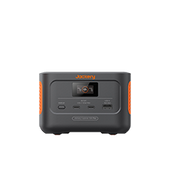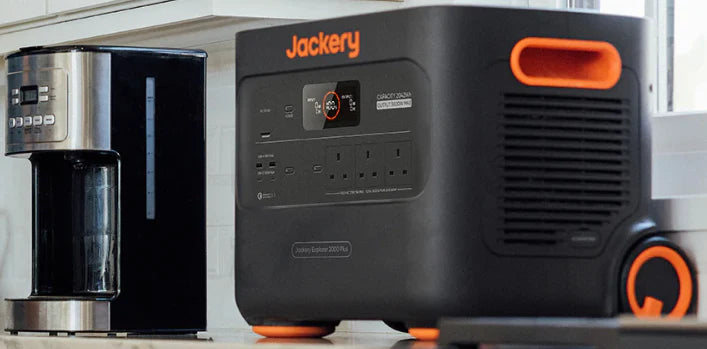What benefits can you get by pairing solar batteries with solar arrays? In the UK, using solar battery storage to reduce energy bills and store extra energy is no longer new. Therefore, combining solar power generation systems and energy storage batteries has become essential for home and commercial users to achieve energy self-sufficiency.
However, the cost of energy storage batteries is still one of the critical factors that many users consider when deploying solar energy systems. This article will analyse the average price of solar batteries, especially 10kWh solar battery price in the UK.
Due to the higher prices of solar batteries for homes, many residents turn to a solar generator instead of a solar panel system to use solar energy on a limited budget. Here, we recommend the Jackery Portable Power Station, which can pair with Jackery Solar Panels to power appliances at home or outdoors.
|
Key Takeaways: |
|
- The most popular solar battery in the UK currently costs between £2,500 and £10,000. - The current price of a 10kW solar battery in the UK market is about £8,000 to £10,000. - Lifespan, warranty period, and installation costs also indirectly affect the price of solar batteries. Please understand the details and eligibility before applying for solar battery subsidies in the UK. - Solar panels and batteries can save about £440 to £1,005 per year. - We highly recommend Jackery Explorer 2000 Plus, which has an expandable power capacity ranging from 2 to 12 kWh, as a wise choice for those who want to install a 10 kWh solar battery system. |
Average Price of Solar Batteries in the UK
Solar batteries can ensure that solar energy can be used even when the solar system is not producing energy, especially in areas such as the UK, where there is less sunshine. However, many UK homes install battery storage systems without solar panels. It is primarily because time-of-use rates allow users to manage electricity costs more efficiently by storing cheaper off-peak electricity during peak hours.
Currently, the most popular solar batteries in the UK cost between £2,500 and £10,000. The price of solar batteries is directly affected by capacity and battery type.

Average Cost of Different Capacities of Solar Batteries
In the UK, there is a significant correlation between the capacity and cost of solar energy storage batteries. Generally speaking, as the battery's capacity increases, its purchase cost rises significantly.
|
Solar Battery Capacity (kWh) |
Solar Battery Price (£) |
|
>1kWh |
£230 – £300 |
|
3kWh |
£2,500 – £3,500 |
|
4kWh |
£3,500 – £4,000 |
|
5kWh |
£4,000 – £5,000 |
|
6kWh |
£5,000 – £7,500 |
|
12kWh |
£9,500 – £10,000 |
(Data Source: Green Match)
The average price of a 3kWh solar battery is between £2,000 and £3,500, while a 6kWh solar battery costs almost double that. In addition to the acquisition cost, large-capacity solar battery systems usually require more complex installation and management systems, increasing the total price.
In short, large-capacity batteries can store more electrical energy and are suitable for long-term energy storage but are more expensive per unit. Although small-capacity batteries have low costs, their energy storage capacity is limited. Meeting the household's all-weather electricity needs is challenging, resulting in less significant overall economic benefits than those of large-capacity batteries.
Average Costs of Different Types of Solar Batteries
Batteries made from different chemistries vary in cost, performance, and lifespan. The mainstream types of solar batteries on the market currently include lithium-ion batteries and lead-acid batteries.
Cost of Lithium-ion Batteries
Lithium-ion batteries have become the mainstream choice due to their long life and fast charging. However, they are relatively expensive. For example, a 4kWh lithium-ion battery storage system costs around £4,000.
Cost of Lead Acid Batteries
Lead-acid batteries are a low-cost, mature technology widely used in low-capacity energy storage systems. Lead-acid batteries are cheaper than lithium-ion batteries. For example, a 4kWh lead-acid battery storage system costs around £2,000. However, lead-acid batteries have a shorter lifespan, typically only 3 to 5 years, and require more frequent replacement, which increases overall costs.
The following is a comparison between a 4kWh lithium-ion battery and a lead-acid battery:
|
|
Lead-Acid Battery (4kWh) |
Lithium-ion Battery (4kWh) |
|
Preliminary Solar Battery Price |
£2,000 |
£4,000 |
|
Depth of Discharge (DoD) |
50% |
90% |
|
Life Cycle |
1,800 |
4,000 |
|
Cost/kWh/ Cycle* |
£0.556 |
£0.278 |
(Data Source: Green Match)
10kw Solar Battery Price in the UK
Solar batteries range in capacity from 1.2kWh to just under 3.3 million kWh (but oversized solar batteries are unsuitable for home use). Typically, home solar batteries have a capacity between 2.4 kWh and 15 kWh. Larger batteries (solar batteries larger than 20kW) are usually used for industrial or commercial purposes, large off-grid homes, or power communities.
If you are not connected to the grid, you must choose a larger battery for your solar panel system, up to 10kWh. According to research, a 10kWh battery can power a typical 3-bedroom house for about 12 hours. (Data Source: dwellow.co.uk)
10kw Solar Battery Price in the UK
The price range of 10kW solar batteries in the UK market is approximately between £8,000 and £10,000. This price range covers products of different technology types (lithium-ion batteries, lead-acid batteries, etc.) and brands.
10kw Solar Battery Applicable Scenarios in the UK
A 5kWh solar battery in the UK is sufficient for most households (the average annual electricity consumption is 2,700kWh). However, if your yearly electricity consumption exceeds 5,000kWh, consider purchasing a larger battery with a capacity of about 9-10kWh. (Data Source: Ofgem)
For example, a one—to two-bedroom house typically requires a 4-7kWh battery to support a 2-3 kW solar panel system.
A large home with four or more bedrooms will need a 13-14 kWh battery to supplement a 6 kW solar panel system.
A 10kw solar battery is usually suitable for a medium-sized house (2-3 bedrooms) with a 4-5kWh solar panel system.
|
Solar Battery Size |
Solar Panel System Size |
Solar Battery Size |
Solar Battery Costs |
|
Small (1-2 bedrooms) |
2-3kW |
4-7kWh |
£3,500-£8,000 |
|
Medium (2-3 bedrooms) |
4-5kW |
9-12kWh |
£8,000-£10,000 |
|
Large (4-5 bedrooms) |
6kW |
13-14kWh |
£10,000+ |
What Factors Influence Solar Battery Price?
In the UK, a combination of factors influences the cost of solar batteries. In addition to the chemical materials and capacity, which are the two direct factors affecting the price of solar batteries, lifespan, warranty period and installation costs also indirectly affect the price of solar batteries. The following are other factors that affect the price of solar batteries in the UK:

Lifespan (Number of Cycles)
In the UK market, solar batteries' service life is usually 10 to 15 years, while solar panels' working life can reach 15 to 30 years. Therefore, the battery pack may need to be replaced several times during the solar panel's life cycle.
Although the initial investment is higher, long-life solar batteries can provide stable power storage and output for a more extended period, reducing the frequency of replacement and thus reducing long-term costs. Generally speaking, the service life of lead-acid batteries can reach 10 years, while the service life of lithium-ion batteries can reach 15 years under regular use.
Depth of Discharge (DoD)
The depth of discharge (DoD) of solar batteries indicates how much energy stored in the battery can be discharged without negatively affecting the battery life.
At present, solar batteries rarely discharge to 100%. The typical depth of discharge of lead-acid batteries is about 50%, while the depth of discharge of lithium-ion batteries is usually 80% or more.
Efficiency
The efficiency of a solar battery is often used to indicate how much of the solar energy transmitted to the battery is stored. However, it is essential to remember that storing energy in a solar battery will inevitably result in some energy loss. For example, lithium-ion batteries are around 90-95% efficient, while lead-acid batteries are around 80-85% efficient.
Brands and Warranties
The reputation of some well-known and reliable solar brands in the solar industry makes them trustworthy, and people are generally more willing to pay a higher price for their solar products. In addition, some of the best solar battery brands also offer the best warranties, guaranteeing the battery capacity or efficiency level for several years. However, consider a more affordable brand if you are on a budget.
Installation Costs
Qualified professionals in the UK usually install solar batteries, so this is another cost to consider. Large solar batteries generally cost more to install than small solar batteries.
Installation costs also depend on factors such as your location, the project's complexity, and the number of engineers required. However, installing solar panels can usually save some installation costs (around £2,000 to £3,000).
How Much Money Can You Save Using Solar Batteries in the UK?
One of the most significant advantages of using solar batteries is that it can save you money on your electricity bill. But how much can solar batteries save? The following will analyse the short-term costs and long-term benefits of solar batteries.
Buying solar panels and energy storage batteries is a huge expense for most British households. In addition, it takes longer to pay for the cost of using a solar panel plus battery system than using solar panels alone: around 26 years. Since batteries have a lifespan of only 10-15 years, the additional savings from adding batteries are unlikely to exceed the cost of the batteries.
Solar panels and batteries can save between £440 and £1,005 per year. (Data Source: Green Match) Among them, a three-bedroom property equipped with a 4-5kW solar panel system and a 9-12 kWh battery can save nearly £830 per year on electricity bills.
While it is impossible to accurately predict how much money a battery can save you, the table below can give you some estimates.
|
Household Size |
Solar Panel System Size |
Solar Battery Size |
Estimated Annual Savings Solar Panels + Battery |
|
1 - 2 bedrooms |
2 - 3kW |
4 - 7kWh |
£520 |
|
2 - 3 bedrooms |
4 - 5kW |
9 - 12kWh |
£830 |
|
4 - 5 bedrooms |
6kW |
13 - 14kWh |
£1,360 |
Factors that Affect How Much Money Solar Batteries Save
In general, it is almost impossible to give an exact figure for the savings of solar batteries. In addition to the purchase price, many variables affect the final savings of solar batteries. Even the savings from solar power itself can vary from month to month. Here are some key factors that may affect how much you can save with solar power:
• The cost of installing solar power.
• How efficiently you use the electricity generated by your solar panels.
• The unit electricity rate (which varies over time and the time of year.)
• The lifespan of the solar battery (the number of cycles)
• Whether you need to spend extra money to repair the cell during the lifespan of the solar battery.
• Solar power grants.
Alternatives of Solar Battery in the UK
As mentioned above, solar batteries in the UK cost more than £10,000, and adverse weather conditions are also a consideration when installing solar panel systems. So we recommend portable power solutions, such as solar generators or portable power stations, to power appliances and save electric bills with minimal costs.
Taking Jackery Portable Power Station and Jackery Solar Generator as an example, if you choose to use the solar generator to power your home appliances, you can save about 50.76 pence per day. If you use it for 10 days, you can save 5 pounds.
This is only by using one piece of Jackery Explorer 2000 Plus, if you add up to three or five packs, you can use over 12kWh electricity, sufficient for a 3-bedroom home. Moreover, it is easy to recharge, and you can use Jackery Solar Panels, wall sockets, carports, or other generators. Once the sun comes out, take your solar panels and portable power station to refuel it quickly for later use, especially for power outages or peak-hour usages.

Jackery Explorer 2000 Plus with 2 to 12 kWh Capacity
While a solar battery is usually part of a fixed home installation requiring professional setup and is mainly used for storing solar energy generated from panels on your roof, choose a portable power station over a solar battery if you prioritise convenience, portability, ease of use, and versatility for powering a variety of devices in different locations. Portable power stations are designed to be easily transported and can be charged from various sources, including wall outlets or car adapters.
While establishing a solar battery system requires professional knowledge and wiring, setting up a portable power station is easy—just plug it in. Besides, portable power stations are always cheaper than solar batteries.
We recommend a Jackery Explorer 2000 Plus portable power station to power your appliances with an expandable capacity from 2 to 12 kWh. The following are the working hours for using Explorer 2000 Plus to charge appliances:
|
Appliances |
Working Hours |
|
Microwave (1050W) |
1.6H |
|
Kettle (850W) |
1.9H |
|
Coffee Maker (550W) |
3H |
|
TV (60W) |
27.2H |
|
Computer (200W) |
8.2H |
(*The working hours are only for reference; the actual working hours depend on your usage.)
Features of Explorer 2000 Plus:
- Expandable Capacity: The Jackery Explorer 2000 Plus Power Station accommodates up to 5 supplementary battery packs simultaneously, increasing its capacity from 2 kWh to an impressive 12 kWh, ideal for road trips, outdoor camping, heavy-duty applications, and home emergencies.
- More Than Fast Charging: There are many ways to recharge the Explorer 2000 Plus. You can recharge it with an AC adapter, which only needs 2 hours, or a car adapter, which needs 25 hours. On sunny days, you can pair SolarSaga 200W solar panels with it to recharge with solar energy. Six pieces of solar panels will recharge it for 2 hours, two pieces for 7 hours, and a single piece for 14 hours.
- Built with Durability & Protection: The robust LiFePO4 battery is designed for longevity, with a lifespan of up to 10 years, even with daily usage limited to once a day. ChargeShield® is Jackery's advanced quick charge technology, featuring 62 protective mechanisms, 12 protective algorithms, and four forms of physical safety protection. It improves safety and extends battery pack longevity by 20 to 30 per cent.

What Can an Explorer 2000 Plus Run:
- Off-Grid Living: Attain energy autonomy with the Solar Generator 2000 Plus, ideal for isolated habitation or prolonged outdoor excursions—experience scalable energy for illumination, electrical devices, and minor appliances.
- Home Backup: The 2000 Plus maintains house functionality during power outages, providing 2 kWh of dependable energy, expandable to 12 kWh. It supplies energy to critical appliances and maintains connectivity during emergencies.
- Professional Work: The Explorer 2000 Plus is perfect for professionals requiring portable electricity at remote locations. Power tools and equipment enhance productivity through their expanded energy capacity.
|
Review from Our User |
|
I currently have three Jackery Solar Generators in my possession. Why? To begin with, Jackery Solar Generators stand out as the most dependable, well-crafted, and budget-friendly options in today's market. In addition, Jackery has the most outstanding service I've ever experienced. Look at my three purchases: E1000v2, E2000v2, and E2000 Plus. I have three 200w Solar Saga Solar Panels that will charge my units in case of an extended power outage. |
Are There Grants Available for Solar Batteries in the UK?
While solar panels may not be cheap in the UK, several grants are available for those who want to pair solar panels with solar and make the most of the energy generated during peak sunshine seasons. However, this excludes most people since they target the poorest and least energy-efficient households. Here are a few UK solar battery grants in detail:
Smart Export Guarantee (SEG)
The Smart Export Guarantee (SEG) came into effect in January 2020 and is designed to encourage homeowners to generate income by sending excess electricity back to the grid. Your installation can be up to 5MW (or 50kW for micro CHP), and you'll need a smart meter to record how much electricity you export.
|
Eligibility for SEG: |
|
To qualify for SEG, you need to generate electricity using: • Solar panels • Wind turbines • Hydroelectric systems • Micro-CHP • Biochemical processes such as anaerobic digestion |
As a SEG participant with solar batteries, you can compare quotes from different SEG licensees and get competitive prices between 1p and 20p per kilowatt-hour (kWh). The average SEG price in the UK is currently between 5 and 10p/kWh. For an average household, the highest SEG tariff can save £300 per year, and the average tariff can save £108 per year. (Data Source: Green Match)
0% VAT
Currently (from 1 February 2025), 0% VAT applies to new solar panels and batteries (in England, Wales and Scotland), retrofitting batteries into existing solar panel installations, and standalone battery storage systems connected to the grid.
|
Eligibility for solar VAT rebate: |
|
Everyone is eligible for a solar VAT rebate if they buy eligible products. • Solar panel systems • solar batteries • Air, ground or water source heat pumps • Micro CHP systems • Heating controls • Insulation • Smart diverters • Wind turbines • Water turbines • Wood boilers |
Currently, at 0% VAT (until 1 April 2027), solar batteries can save an average household between £1,500 and £4,100 (per year).
Warm Homes: Social Housing Fund
Funds from the Warm Homes: The Social Housing Fund (formerly the Social Housing Decarbonisation Fund) can be used for energy-efficient retrofits (improving the country's 1.2 million social homes with an EPC rating below C), including solar and battery systems. Individual households cannot access Warm Homes: Social Housing Fund funding.
Eligibility for the warm homes: social housing fund:
All local authorities, social housing providers and charities with social housing are eligible to apply for the third wave of grants if they have not received the second wave.
The third wave of grants will end in September 2028, but another wave will likely be launched after that. If successful, they will receive a grant of up to £7,500 for each social home they operate.

Future Price Movements for Solar Batteries
The future price trend of energy storage batteries has attracted widespread attention as a key technology for the UK's energy transformation. The cost of energy storage batteries has dropped significantly in recent years.
According to data from the UK National Grid, the cost of lithium-ion battery systems has fallen by about 80% in the past decade. Currently, the UK energy storage market is dominated by lithium-ion batteries. Their cost-effectiveness and performance advantages make them the technology of choice for household, commercial, and grid-scale energy storage projects.
In the short term, the price of energy storage batteries is expected to remain fluctuating in the next 1-2 years, but the overall decline will be limited. In short, with the advancement of technology and large-scale production, the cost of energy storage batteries will decline. In addition, in the UK, policy support and market competition will also drive down the price of solar batteries. For example, the British government plans to achieve a storage capacity of 30GW by 2030.
In the long run, the price of energy storage batteries is expected to drop significantly. Technological breakthroughs and industrial upgrades will dramatically reduce costs. By 2035, the cost of energy storage batteries is expected to be less than half of the current level. However, the above content is all speculation, and the specific situation is unknown.
FAQs
The following are the frequently asked questions about the 10kW solar battery price in the UK:
1. How much does a 10kW solar battery cost in the UK?
A 10kW solar battery typically costs around £10,000 in the UK. However, the price of solar batteries varies depending on various factors.
2. How long will a 10kW battery power my house?
A fully charged 10kWh battery can typically power your home for around 30 hours. If you use more electricity, such as doing multiple loads of laundry daily or working from home and leaving the kettle on all the time, this will be less than 30 hours.
3. Is a 10kWh battery enough to power a house?
Whether a 10kWh battery is enough to power a house depends on the size of your home, your electricity usage habits, and whether you have other energy systems in place.
In the UK, a 10kWh battery is sufficient to power the electricity needs of an average household (small or energy-efficient home) (approximately 9kWh per day) when used with a renewable energy system such as solar panels.
Final Thoughts
While solar batteries currently seem daunting in price, they are expected to become more affordable as they become more common, similar to the early trends in solar panel costs. In addition, using solar batteries in the UK can significantly save a household's electricity bills in the long term and speed up the return on investment through government subsidies and tax benefits. If you think it is too costly to install solar batteries in your home, the Jackery Portable Power Station is a wise choice.




























































































![Guide to 10kW Solar Battery Price in the UK [2025 Update]](http://uk.jackery.com/cdn/shop/articles/10kw_solar_battery_price_in_uk_guide_ba971414-a29c-45f5-ba99-002de4ea8d1c.png?v=1739930994)





